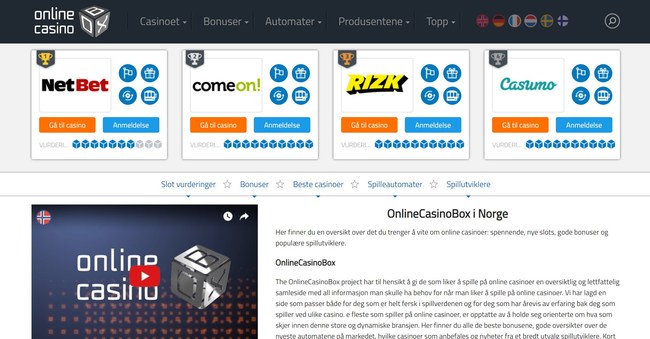 OnlineCasinoBox i Norge (PRNewsfoto/OnlineCasinoBox)
OnlineCasinoBox i Norge (PRNewsfoto/OnlineCasinoBox)
Online casinos are big business, generating almost $50 billion annually and providing employment to hundreds of thousands of people around the world.
The success of casino sites is only sustained because the software that underpins the entire player experience is so dependable.
So how does this software work and are there any industry-specific features that are worth investigating further?
Evening the Odds

The most important aspect of online casino software is arguably the way in which it handles odds. In land-based casinos, the importance of luck and random chance are often discussed, but even if you think that anything could happen with each throw of the dice, this simply isn’t the reality of the situation. Casino games are specifically designed to keep people playing while ultimately ensuring that the house always makes back enough cash to stay in profit.
The same rules apply to online equivalents, although there are even more permutations and variations of how randomness and control are counterbalanced.
Take online slots, for example. Each game will have a predetermined return-to-player (RTP) setting which indicates what proportion of the takings will be paid out over time. The higher the percentage of the RTP, the less money the operator will make. Lower value games will have lower RTPs to allow more money to be made over longer periods, while high stakes games will have higher payouts to help players justify the upfront risk.
At the core of this is software that manages these payout rates and also juggles in random number generation (RNG) to determine the outcome of each spin of the reels, roll of the dice or shuffle of the deck. Of course there are different types of RNG to consider and ultimately an online casino’s software will allow randomness within predetermined operational limits.
Enhancing User Experience

The complicated nuts and bolts of online casino software are cleverly masked by the interface elements, which need to be as eye-catching and intuitive as possible in order to keep punters coming back for more.
This has become even more important in the smartphone age, with most people now browsing the web and enjoying interactive entertainment from their mobile devices. As such casino software needs to be adaptive and responsive to the changing needs of each user, catering to players who may be running entirely different operating systems on handsets with very different screen sizes and input options.
Some developers achieve this more successfully than others, which brings us to an interesting and oft-overlooked point about the online casino industry; it is not dominated by a single software company, but instead consists of lots of brands vying for attention.
Certain casino sites develop all of their software in-house, creating a holistic experience which can be controlled and managed closely. Others outsource the majority of this to third parties, pulling in games which are created externally and simply hosting them under one roof. The former results in a more consistent if less varied experience, while the latter gives players more choice but can mean that quality can go up and down from game to game.
Processing Payments

Cash is key to keeping the wheels of online casino services turning, so it is clearly important to ensure that the software is optimised for accepting deposits from players, as well as facilitating withdrawals in the event that they win big.
Most sites allow for transactions to be carried out via credit and debit card, as well as via modern web-based payment solutions such as Skrill and Neteller. The latter platforms give players more flexibility and also allow for cross-border play more easily, which is important given that online casinos are often not officially supported in certain countries and so people must look to overseas operators to get their gaming fix.

Ultimately it is this balance between user-friendliness and functionality that online casino software must strike which ties it in closely with other services of this kind. Likewise the resilience of the infrastructure on which each site is hosted has to be impressive, as even minor outages can leave customers feeling disgruntled and whittle away at any loyalty that has been developed.




